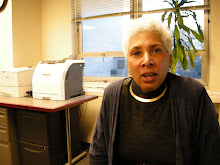Book Club Review February 18, 2009
At 7pm we all rode up the elevator with James, who produced this Carleton College Book Club event. The author, Annette Gordon-Reed’s braids frame her face. She was dressed simply. I had studied her photo on the book’s jacket and the Internet images of her and husband, Judge Reed. The CNN interview with Charlie Rose was the most recent image; so I spoke. Off the elevator we entered Frances Spangler’s apartment overlooking the Manhattan Bridge.The joy was as subdued as Professor Gordon. For three years members have traveled monthly via subway, PATH train or driving to attend our Book Club.We come from as far away as Little Ferry, New Jersey. We all bring a dish to share. This Wednesday, February 18th, 2009 we all also brought the book The Heminges of Monticello for signing. Some of us brought two books! My guest, the poet Jacqueline Johnson pulled the sales tag from my discounted copy--$28.75 from Strand bookstore on 13th Street.
We pulled chairs and a stool around Professor Gordon seated on the couch. Frances served white and red wine; we nibbled on falafel tidbits, Chinese beef dumplings, sushi, several varieties of cheese, the local Brooklyn specialty:mozzarella pizza from down the block, raw veges for a spinach sour cream dip and cookies.
We have had other authors attend our meetings so we know to tread lightly when we long to speak frankly. Who suggested this book? Who is to start? We were quiet, longer than usual imitating Professor Gordon’s mood. Were we reflecting on the neglected history of Sally Hemings? When we started to speak it was uncharacteristically one at a time. The conversation went on past 9:30pm.
My great surprise was that this 600 page non-fiction book contained so many diverse topics that I shuddered to choose one to query. Would I ask about the history, The Revolutionary War, The French Revolution; politics; the culture, slavery, feminism; medicine, deaths in motherhood, typhoid fever, whooping cough and what urogenital pathology did Thomas Jefferson suffer; genealogy, family names so repetitious; inheritances; the scholarly research of over ten years, her critics and disbelievers; the law that changed over the years, its philosophy, its psychology that perpetuates the myth of race. One Carl alumn remarked that the writing spoke to several audiences; Professor Gordon responded her intent. Lastly can we discuss the families post-Monticello. Who are they? Where are they today? That is her next book.
Eleven Carls politely tossed questions and comments. Which were met with verbose answers that recaped Professor Gordon’s evidentiary text while admitting historic gaps. We queried the parodox—Jefferson’s public writing did not sufficiently describe his private life style. Or did it? When Professor Gordon presented her conclusions her voice sourced a thorough comprehension of ALL of the above mentioned topics. And more importantly was sourced in an understanding of Thomas Jerrerson as he saw himself. She reminded us as she repeatedly does in The Heminges of Monticello (some have reviewed her writing as a ‘brief’) that these times and this culture may not be respected by the modern thinking feminists in attendance. This research is meticulously footnoted showing how readings of multiple letters and historic documents require deductions. How would you describe a thirty-eight year relationship between Thomas Jefferson and Sally Hemings at Monticello? MyrnaWilliams
Subscribe to:
Post Comments (Atom)

No comments:
Post a Comment